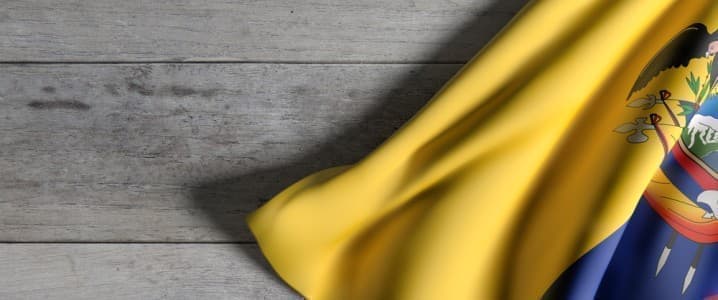In a surprise development, center-right businessman Daniel Noboa defeated leftist lawyer Luisa González last Sunday to become Ecuador’s youngest-ever president. The election, triggered by incumbent president Guillermo Lasso’s decision to dissolve Ecuador’s National Assembly to avoid impeachment, was marred by an unprecedented level of violence. In a tragic first-time-ever event in Ecuador, a presidential candidate, anti-corruption campaigner Fernando Villavicencio, was assassinated just days before the first voting round in August 2023. Noboa, who will assume the remainder of Lasso’s term of 17-months, until May 2025, has his work cut out for him with a catastrophic security crisis and flailing economy weighing heavily on Ecuador.
When Lasso took office as president in May 2021, Ecuador was locked in a deep sociopolitical crisis fueled by civil dissent due to a spiraling cost of living, a waning economy and deteriorating domestic security. Those events along with the fallout from Lasso’s neoliberal economic reforms, which caused the cost of living to spiral higher, and growing environmental damage in the Amazon by Ecuador’s oil industry sparked violent antigovernment protests during 2022. The protests severity forced state-controlled Petroecuador to declare force majeure, sharply impacting Ecuador’s economically crucial oil production and exports. The ongoing impact of the economic and political crisis gripping the Andean country caused oil production to decline and the hydrocarbon sector to stagnate, further impacting an already vulnerable economy.
By mid-October 2023, Ecuador was lifting just under 485,000 barrels of oil per day, which is substantially lower than pre-pandemic production of 540,000 barrels and significantly less than Lasso’s goal of lifting output to 600,000 barrels per day. Indeed, on taking office, Lasso pledged to lift Ecuador’s oil production to one million barrels per day but was forced, multiple times, to lower that target as infrastructure outages and anti-oil industry protests sharply impacted output. There are signs that a recovery for Ecuador’s oil industry is a long way off, boding poorly for the country’s petroleum-dependent economy. Heightened insecurity and a long-running political crisis are deterring foreign energy investment.
Petroleum products are Ecuador’s main export, generating $13 billion of revenue during 2022, which accounted for nearly 35% of all export income that year. Oil rents are responsible for 6% of the Andean country’s gross domestic product and generate around a third of government revenue. This reliance on petroleum leaves Ecuador’s fiscally fragile economy vulnerable to movements in oil prices and falling hydrocarbon output. Declining petroleum revenues are hitting the Andean country’s economy hard at a time when the tiny country of less than twenty million is stricken by a deep-set crisis that is destroying a decade of progress. Economic growth since the pandemic has been muted, with the IMF reporting that 2022 GDP expanded by 2.9% and forecasting it will expand by a mere 1.4% in 2023. A weak economy, as well as rising poverty are also responsible for the surge in crime and violence.
The fallout from those events is being magnified by the severe security crisis roiling Ecuador, where the considerable profits from cocaine trafficking are fueling a surge in violence. In a mere five years, Ecuador’s homicide rate has surged nearly fivefold from 5.7 murders per 100,000 people in 2018 to 25.9 murders per 100,000 head of population in 2022. This, sadly, is a record high for Ecuador, a country once celebrated for its relatively low levels of violence in a volatile region where many neighbors are wracked by conflict, It is the fourth highest murder rate in Latin America, higher than even Mexico which is marred by conflict between various drug trafficking cartels. Public displays of violence in Ecuador are rising with the gruesome display of corpses hanging from bridges in the largest city Guayaquil and the murder of gangland players by hired gunmen in the streets.
Ecuador, which is sandwiched between Colombia and Peru, the world’s largest producers of cocaine, emerged as a key South American transshipment hub for the narcotic because of its large Pacific ports and porous borders. The amount of cocaine flowing into Ecuador is surging with it reported that the volume of seizures for 2022 grew threefold when compared to 2020 to over 77 metric tons. While the massive inflow of cocaine into Ecuador is the primary driver, a combination of weak state institutions, a flailing economy, a series of never-ending political crises, and corruption are allowing the narcotics trade to flourish.
President-elect Noboa, the son of Ecuador’s wealthiest man, banana baron Alvaro Noboa, has proposed a contradictory mix of policies to tackle Ecuador’s economic and security crises. This includes expanding social programs to reduce poverty and improve education while introducing a hardline crackdown on crime and reforming Ecuador’s notoriously corrupt prison system. Noboa plans to create a new national intelligence agency reporting solely to the president, and expand the Ecuadorean military’s role in fighting crime. The president-elect will also build maximum security prison ships to hold the country’s most dangerous prisoners offshore and install militarized surveillance systems in poor neighborhoods. It will take a considerable investment to implement those ambitious plans, which is difficult for Ecuador’s already fiscally constrained government.
Key to boosting Quito’s finances is rebuilding Ecuador’s economy and putting the country back onto a trajectory of growth. To do this, Noboa will need to reevaluate the economically crucial oil industry with a view to implementing the policies required to attract greater foreign energy investment in upstream and downstream operations, which will bolster production. This also includes addressing many of the environmental concerns related to industry operations in Ecuador’s Amazon basin, where oil spills, flaring and other environmentally damaging activities have been commonplace. The growing backlash against the oil industry saw Ecuadorians vote, in a recent referendum, to ban oil exploration in the 2.5 million acre Yasuni National Park.
By Matthew Smith for Oilprice.com
More Top Reads From Oilprice.com:
- Is Green Hydrogen An Opportunity Or Distraction For The U.S.?
- Aluminium Demand Gets Boost From Backlog In Aircraft Production
- Aluminum Prices Swing Amid U.S.-EU Tariff Talks


















